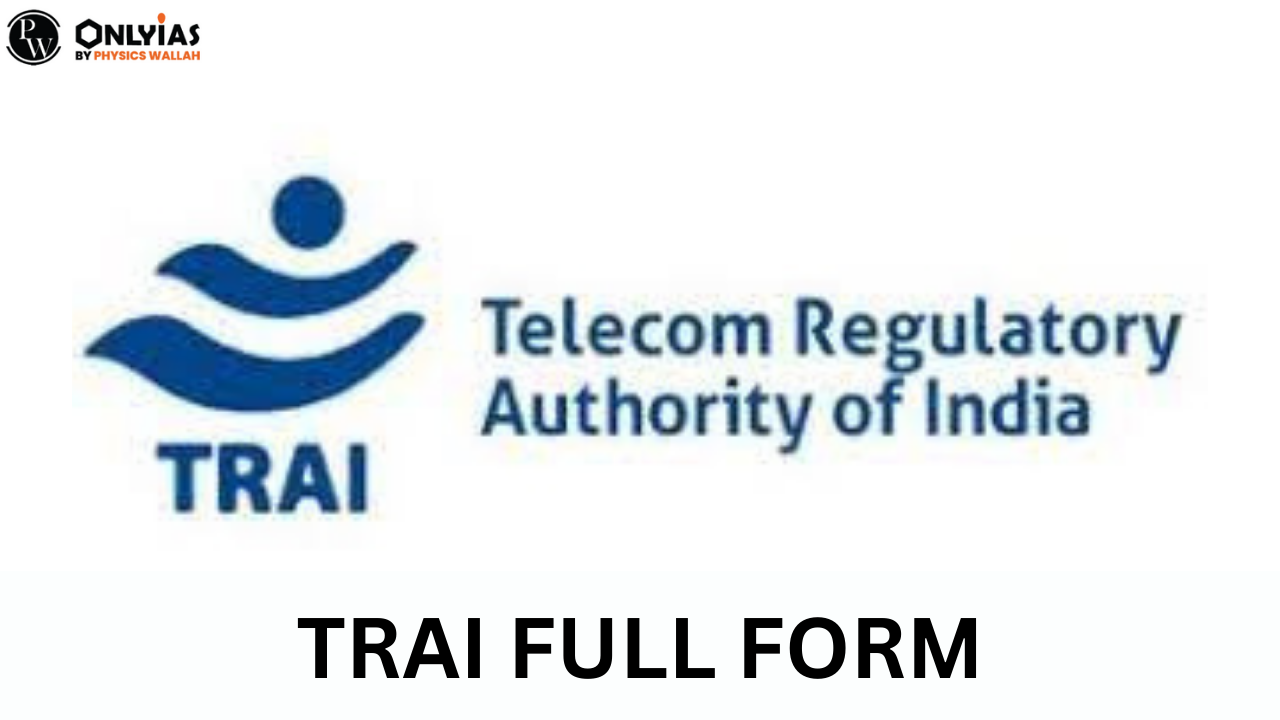TRAI Full Form is Telecom Regulatory Authority of India. Learn about TRAI's role in regulating telecommunications and broadcasting sectors, promoting fair competition, protecting consumer interests, and fostering technological advancements in India.

TRAI stands for “Telecom Regulatory Authority of India.” It is an independent regulatory body established by the Government of India to oversee and regulate the telecommunications and broadcasting sectors in the country. TRAI plays a crucial role in ensuring fair competition, protecting consumer interests, and promoting efficient and transparent practices within the telecommunications industry in India.
| TRAI Full Form | |
|---|---|
| Full Form | Telecom Regulatory Authority of India |
| Origin of TRAI | 20th February 1997 |
| Chairman of TRAI | PD Vaghela |
| Headquarter of TRAI | New Delhi |
TRAI, which stands for the “Telecom Regulatory Authority of India,” is an autonomous regulatory body established by the Indian government to oversee and regulate the telecommunications and broadcasting industries in the country. TRAI’s main objective is to ensure a fair and competitive environment within these sectors, while also safeguarding the interests of consumers. It formulates policies, issues regulations, and monitors the implementation of these regulations to ensure the smooth functioning of the telecommunications and broadcasting sectors in India. TRAI’s role includes promoting transparency, ensuring quality of service, and addressing issues related to tariffs, interconnections, and consumer protection within the realm of telecommunications and broadcasting.
The long form of TRAI is the “Telecom Regulatory Authority of India.” TRAI is an autonomous regulatory body established by the Government of India to oversee and regulate the telecommunications and broadcasting sectors in the country. It was established in 1997 under the Telecom Regulatory Authority of India Act, 1997.
TRAI’s primary role is to ensure a fair and competitive environment within the telecommunications and broadcasting industries while safeguarding the interests of consumers. It formulates policies, issues regulations, and monitors the implementation of these regulations to ensure the smooth functioning of the sectors.
TRAI’s functions encompass a wide range of areas, including policy formulation, licensing and spectrum management, tariff regulation, quality of service standards, interconnection regulations, and consumer protection. It promotes fair competition, prevents anti-competitive practices, and works to maintain the quality of services provided by telecom and broadcasting operators.
The authority also conducts public consultations on key regulatory matters, gathers input from stakeholders, and makes informed recommendations to the government. It plays a significant role in addressing legal disputes, ensuring transparency, and fostering the growth of the telecommunications and broadcasting sectors in India.
Overall, TRAI’s existence is essential to ensuring a balanced and efficient regulatory framework within the rapidly evolving telecommunications and broadcasting industries in India.
The origin of TRAI (Telecom Regulatory Authority of India) can be traced back to the need for an independent regulatory body to oversee and regulate the rapidly expanding telecommunications sector in India. Prior to the establishment of TRAI, the telecom industry in India was primarily regulated by the government through the Department of Telecommunications (DoT).
The key events leading to the formation of TRAI include:
The Telecom Regulatory Authority of India (TRAI) has a structured framework to fulfill its regulatory and oversight responsibilities within the telecommunications and broadcasting sectors. The structure of TRAI typically includes the following components:
The Telecom Regulatory Authority of India (TRAI) has a set of well-defined objectives that guide its regulatory and oversight functions within the telecommunications and broadcasting sectors. The primary objectives of TRAI include:
The Telecom Disputes Settlement Appellate Tribunal (TDSAT) is a specialized judicial body in India that was established to adjudicate and settle disputes and grievances related to the telecommunications and broadcasting sectors. TDSAT plays a crucial role in addressing legal matters and conflicts that arise within these industries. Here are some key points about TDSAT:
The Telecom Regulatory Authority of India (TRAI) is vested with a range of powers and functions to effectively regulate and oversee the telecommunications and broadcasting sectors in India. Here are the key powers and functions of TRAI:
| IAS General Studies Notes Links | |
|---|---|
| G20 Summits List | List of Major Dams in India |
| Chandrayaan-3 | Neighboring countries of India |
TRAI stands for "Telecom Regulatory Authority of India."
TRAI is responsible for regulating and overseeing the telecommunications and broadcasting sectors in India. It formulates policies, issues regulations, and monitors their implementation to ensure fair competition, consumer protection, and quality of service.
TRAI encourages the adoption of advanced technologies and innovations within the sectors, fostering growth and development of communication and broadcasting technologies in India.
TRAI plays a crucial role in creating a transparent and competitive environment in the telecommunications and broadcasting sectors. It ensures that consumers receive quality services at fair prices while promoting technological advancements and innovation.
TRAI was established on Feb 20, 1997, under the Telecom Regulatory Authority of India Act, 1997.

<div class="new-fform">
</div>